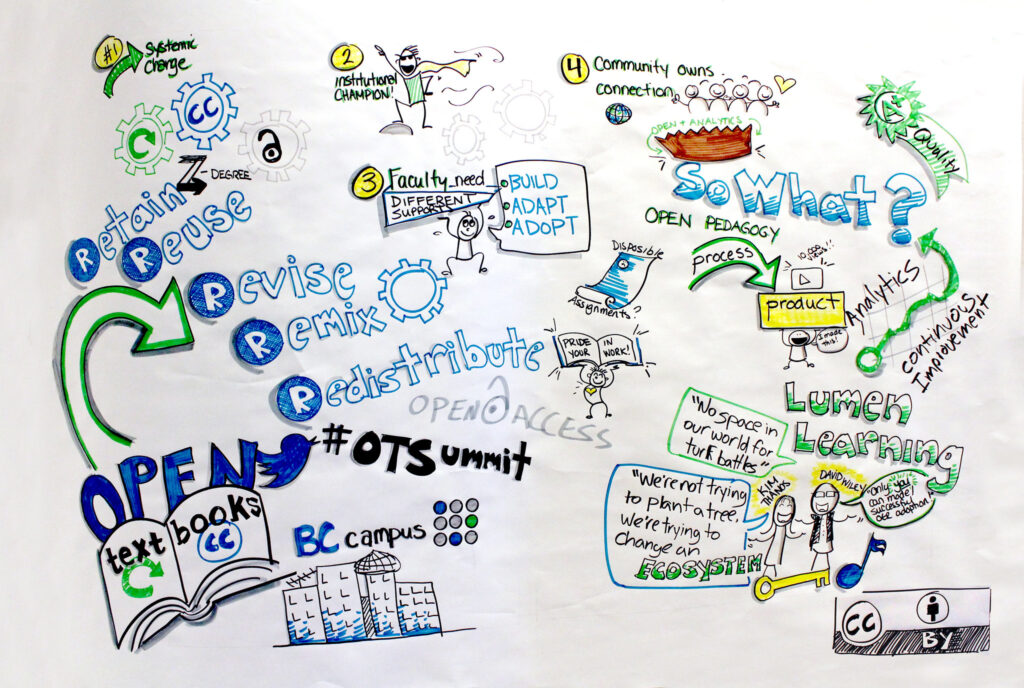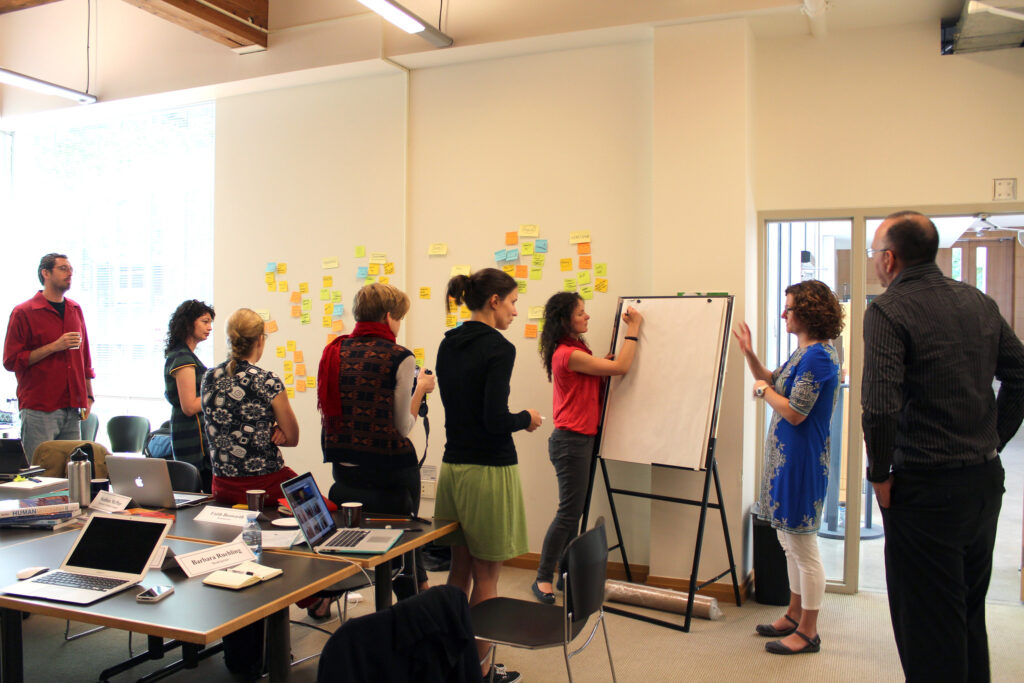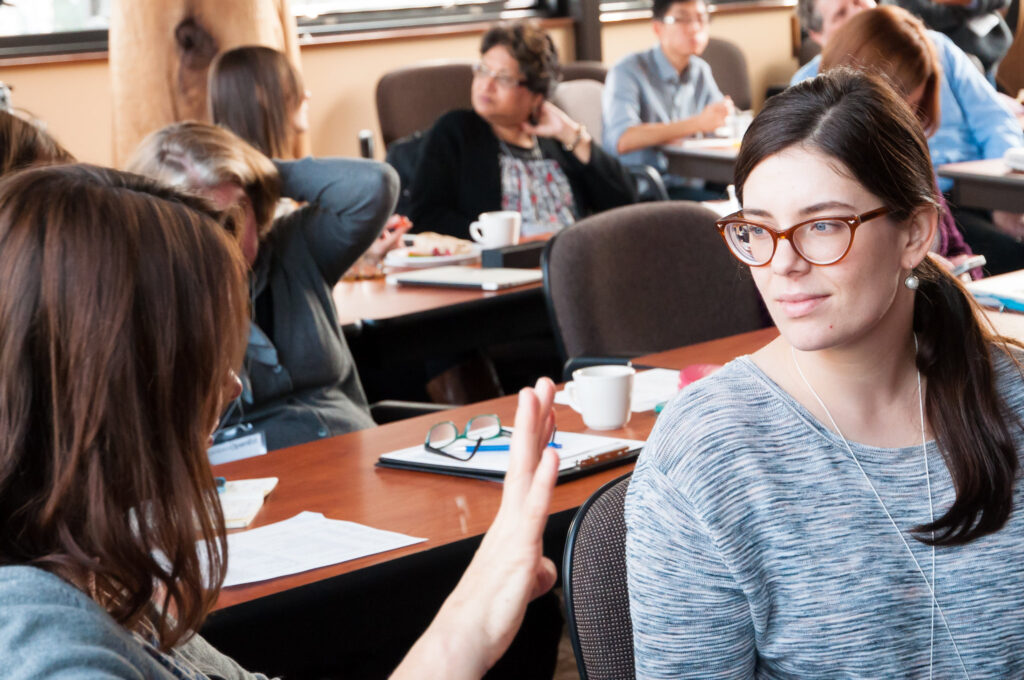With planning well underway, 2014 proved to be a year of firsts for the B.C. Open Textbook Project. It was the year that open textbook writing began in earnest, faculty members and librarians rolled up their sleeves and got to work, and B.C. invited the world to join them in an open education conference setting.
By Lauri Aesoph, manager, Open Education Operations
B.C. Open Textbook Summit
Even though the province’s first Open Textbook Summit happened in 2013 with 25 participants seated boardroom-style in one room, it can be argued this annual gathering became a true conference the following year when over 100 people signed up to present and discuss open textbooks and their role in affordable higher education.

Over time this spring conference became a regular event scheduled every other year (2015, 2017), while alternating with the Festival of Learning (2016, 2018, 2020) and Cascadia Open Education Summit (2019), where hundreds of open education advocates came together from B.C., North America, and the globe to share and learn about open education.
Not satisfied with the status quo, BCcampus used participant comments to improve the next year’s conference with these results:
- In 2016 four annual events were brought together under one roof (Open Textbook Summit, Educational Technology Users Group, British Columbia Teaching and Learning Council, BC Teaching and Learning Network) for a richer conference experience.
- Practical solutions to open education issues were explored in 2017 using new session formats that varied in length and configuration.
- Embracing inclusivity was the theme in 2018, where free childcare, yoga and meditation breaks, accessible spaces, gender-preference pronoun ribbons, and both gender-specific and all-gender restrooms were available.
- In 2019 BCcampus Open Education co-hosted its annual event with regional colleagues in Washington and Oregon.
- After the Festival of Learning was cancelled in 2020 due to the pandemic, BCcampus co-hosted the first all-virtual Cascadia Open Education Summit in 2021.
Calling All Faculty Authors
While the Open Textbook Project had already funded the major adaptation of open textbooks, 2014 marked the first time faculty authors were invited to write an open textbook from scratch. The results from this call include books still in use, such as Canadian History: Pre-Confederation and Physical Geology (both in their second edition).
That same year the first call for proposals seeking authors to create or adapt open textbooks for skills training and technical programs was posted. The Trades Common Core series is one of many openly licensed and highly used resources that came from this effort.
Sprint into Action

Another tactic used in 2014 to generate new open textbooks was organizing the first BCcampus open textbook sprint, a collaborative face-to-face event that spanned four days and involved five faculty authors who wrote a complete geography textbook. The authors’ work was supported by a facilitator, librarian, researcher, illustrator, programmer, and instructional designer.
Blogs recorded the process in real time, from brainstorming to layout to incorporating open pedagogical principles to completion. The team produced 48,420 words organized into eight chapters of a book entitled British Columbia in a Global Context. Like many of the books created by the Open Textbook Project that year, this one is still available in the B.C. Open Textbook Collection.
Faculty as Pioneers
The BCcampus Faculty Fellows Program began in 2014 with Dr. Jessie Key, a chemistry professor at Vancouver Island University (who later spearheaded the adoption of a Chemistry (OpenStax) adaptation for all first-year course offerings at VIU); Dr. Christina Hendricks, a senior instructor of philosophy from the University of British Columbia (now academic director at UBC’s Centre for Teaching, Learning and Technology and managing editor of the Introduction to Philosophy open textbook series); and Dr. Rajiv Jhangiani, a psychology instructor at Kwantlen Polytechnic University (now associate vice president of KPU’s Teaching & Learning Commons and overseer of open education at KPU).
The goals for this first cohort were to encourage open textbook adoption in B.C., encourage the province’s faculty to adapt and write open textbooks, and provide input on how to improve the quality and relevancy of the B.C. Open Textbook Collection. You can read more about this program in Faculty Fellows 2014–2015 Year in Review.

Librarians Lead the Way
Librarians who wanted to help B.C.’s post-secondary educators find and use quality open educational resources formed BCOER in December 2013 (a name that was changed, a few years later, to BCOEL—BC Open Education Librarians) and began strategizing in 2014.
Led by Leva Lee from BCcampus, BCOER held its first planning meeting in May, followed by a second that summer. “What I’m most proud about this group,” says Lee, “was how we were ground-breakers in terms of librarians involved in open education in North America.” This became apparent when two prestigious organizations, SPARC (the Scholarly Publishing and Academic Resources Coalition, which works to enable the open sharing of research outputs and educational materials) and CARL (the Canadian Association of Research Libraries), approached BCOER for ideas and advice. Many librarian members have said working with BCOER has raised the profile of librarians and created many new and exciting opportunities in open education for them.

This year marks the tenth anniversary of the launch of the B.C. Open Textbook Collection, and we’re celebrating the collection all year long. Stay tuned for the next post in our B.C. Open Textbook Collection Through The Years series as we revisit the milestones from 2015. Always get the latest information on news and events by subscribing to the BCcampus newsletter.
